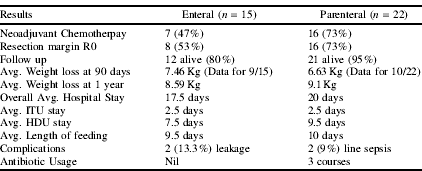Malnutrition is common in patients with upper gastrointestinal cancer. Studies have shown benefits of peri-operative nutritional support in these patients. Commonly post-operative nutritional support is delivered enterally via a jejunostomy tube or parenterally. Two prospective randomized studies show there is no significant difference between these two methods with regards to complications but suggests enteral route to be safe, well tolerated and cost-effective(Reference Sand, Luostarinen and Matikainen1, Reference Baigrie and Devitt2). Whilst the two upper Gastrointestinal (GI) surgeons in Dudley share similar operative methods and techniques, one uses jejunostomy tube feeding, and the other parenteral nutrition.
Methods: Patients attending the Dudley Group of Hospitals for upper GI cancer surgery who received both methods of post-operative nutritional support since March 2009 were identified and comparisons of their outcomes made (n=90, notes available for 37). Data collected includes patient demographics, type of cancer, TNM staging, resection margins, mortality, length of hospital stay, duration of nutritional support, any complications related to feeding methods used and antibiotic usage to treat complications.
Results: Fifteen patients (12 males, median age 71 years) were fed jejunally. Oesophageal adeoncarcinoma (47%) and gastric adenocarcinoma (40%) being the commonest malignancy with T3–67% and N1–67%. Twenty two patients (18 males, median age 65 years) received parenteral nutrition. Oesophageal adenocarcinoma (68%) being the commonest malignancy with T3–68%, N1–50% and N0–45%. In both groups there was no evidence of metastases pre-operatively.

Discussion: The power of this study is limited by the low number of patients, however, both methods of nutritional support provide comparable outcomes, with weight loss appearing inevitable, mostly in the peri-operative period. There is a slightly increased risk of complications in jejunostomy feeding group where as increased length of HDU and hospital stay, and antibiotic usage in parenteral feeding group was noted.


